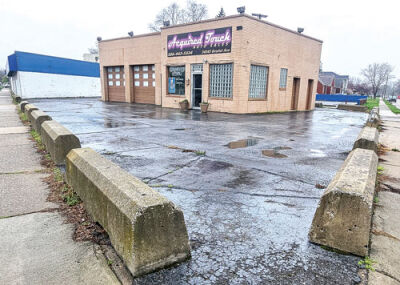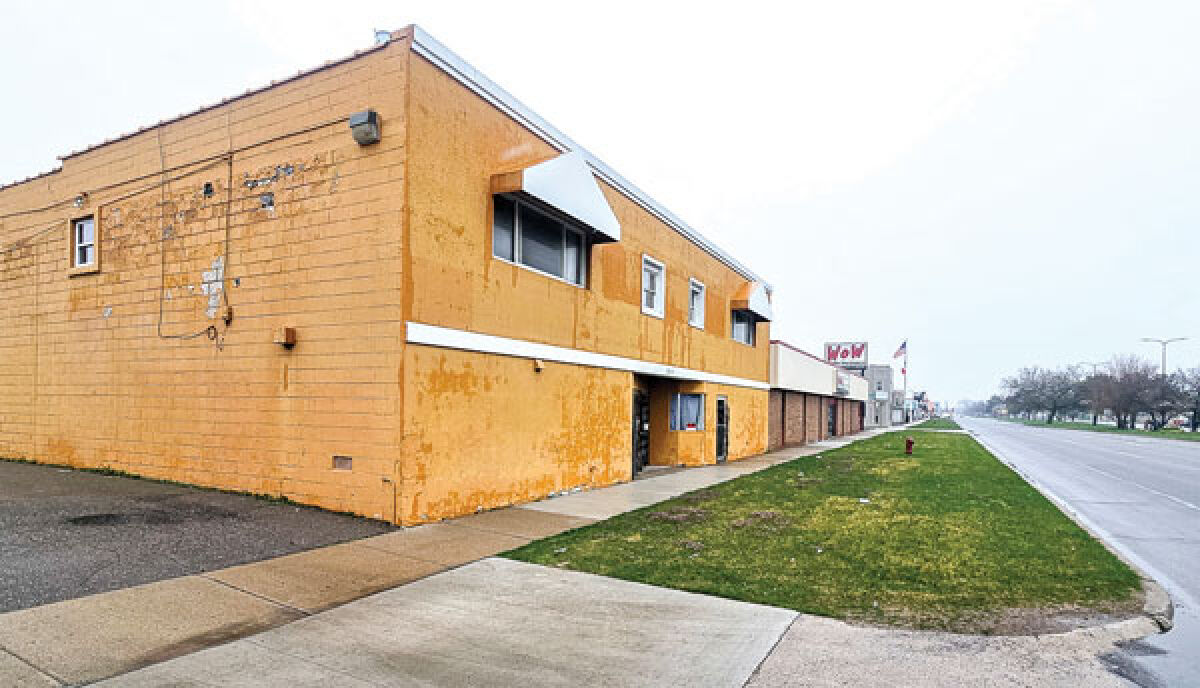
Common Citizen, one of three medical marijuana dispensaries granted a license by the city of Eastpointe, was expected to open at 24545 Gratiot Ave.
Photo by Patricia O’Blenes
EASTPOINTE — The city of Eastpointe is considering an ordinance that would allow it to give out a certain number of recreational marijuana licenses. While some residents have shown support, many have attended City Council meetings to voice their opposition to the ordinance.
Adult-use recreational marijuana was legalized in Michigan in 2018. However, Eastpointe initially opted out of recreational marijuana dispensaries.
In 2021, City Council passed an ordinance allowing medical marijuana facilities to open in Eastpointe. In 2022, a committee was formed to review and approve three licenses: Holistic Health Wayne, 21145 Gratiot Ave.; Moses Roses, 17375 E. Eight Mile Road; and Common Citizen, 24545 Gratiot Ave.
Now, City Council has asked City Attorney Richard Albright to draft an ordinance that would allow recreational marijuana businesses to open in the city.
Councilwoman Margaret Podsiadlik introduced the item at the City Council’s March 19 meeting, citing economic benefits to the city. No action was taken on the item.
“I think it could be beneficial to our community and our city,” she said. “I’ve worked in downtown Mount Clemens, and they have facilities down there that are beneficial. I think it’s a good idea to bring in some recreational marijuana facilities for our community.”
Podsiadlik added that while she supports the businesses currently in Eastpointe, it would be beneficial to bring in new businesses to help fill vacant buildings. She said communities like Utica have used the funds gained from recreational marijuana facilities to improve parks.
“I hope no one takes it incorrectly. I’m very supportive of our local businesses, but we need to bring business in,” she said. “There’s a lot of vacancies.”
Councilman Harvey Curley was first to voice his support at the March 19 meeting, stating that the city would be receiving tax dollars from recreational marijuana that it wouldn’t receive for medical marijuana.
“How do I say this without thinking I’m greedy,” he said. “But I am greedy. Because with the medical marijuana, the city doesn’t get anything except maybe a business tax. But with recreational marijuana, the cities, municipalities, do get money.”
Curley said he found in his own research that about 269 different municipalities were receiving money from recreational marijuana facilities in April.
In a press release dated Feb. 29, the Michigan Department of Treasury stated that 99 cities, 30 villages, 69 townships and 71 counties would be receiving payments from the Marihuana Regulation Fund of more than $59,000 for each licensed retail store and microbusiness within its jurisdiction.
Curley also added that the increase in revenue should be given to the parks.
“Also being greedy and interested in the parks, I would tell the council if this passes, I will argue with the administration that I think all the monies should be earmarked for the parks,” he said. “There are some parks that have nothing except grass, and that’s ridiculous. That’s terrible.”
Albright said council would need to determine if it wanted to allow more than three licenses, and if so, if the city would give preferential treatment to the three licenses already awarded for medical marijuana. Podsiadlik said that the three businesses would make more money if they opened as recreational licensees, and Curley said that he would be in favor of offering the three companies the opportunity to have recreational licenses.
“I think we should just stick with three and award recreational licenses to those that have already gotten medical licenses,” he said.
Councilman Rob Baker, who said he has never been in support of marijuana businesses, voiced concern that other businesses might sue the city if it awards recreational licenses to the three businesses instead of having an open application process.
“If we do that, you might as well put a fan in front of the window and watch your money blow right out, because there will be a number of people coming forward saying they did not have a chance to apply for a recreational license,” he said on March 19.
Residents at council meetings voice concerns, support
While the ordinance wasn’t brought up by council at its April 2 meeting, many residents took advantage of the public comment portion of the meeting to voice their support or opposition to the topic.
During the first public comment portion, which lasted about an hour, many residents voiced concerns about having to smell marijuana and how to keep children from having access. Many cited statistics that they said showed a potential for things like increased crime and decreased property value, while others cited statistics that they said showed a different result.
Many residents opposing the ordinance voiced concerns over increased crime, lower property values and the effect that marijuana can have on people.
Lynn Tubben, who said she’s been a resident of Eastpointe for 54 years, was worried about the effect that marijuana can have on youths and young adults. She worried that marijuana could lead to a number of disorders and “having lives of lower income capabilities, greater welfare dependence, unemployment, criminal behavior and lower life satisfaction.”
“Because of your desire for additional tax revenue, you will be advocating irresponsibility to our citizens just for their profit,” she added. “And in doing so, (you will be) jeopardizing the character and stability of our city. … Our now-called ‘family town’ would soon become a place where families and businesses no longer exist.”
Karen Mouradjian was concerned about the harm that smoking marijuana could have on kids and animals in the same house, as well as concerns over the smell.
“There’s nothing responsible about smoking pot when you have kids and animals in the house,” Mouradjian said. “That puts both in harm’s way.”
“When you go to the store, you’re in the parking lot, you get out of your car, there’s that disgusting stench,” she added.
Eastpointe resident Willie Twymon asked how kids would be kept safe if recreational marijuana facilities were allowed to operate in the city.
“What are we saying to our children. … How are we going to discipline them? How are we going to do it?” she asked council.
Several residents in support of the dispensaries compared marijuana to alcohol. However, Cynthia Davis stated that unlike marijuana, alcohol doesn’t have a smell until you get close to it.
“I hear a lot of people talking about the sale of cannabis and how it relates to alcohol. Alcohol you can’t smell until a person walks past you,” she said.
Eastpointe resident Cathi Schloss said she wasn’t planning to speak at the meeting, but she wanted her voice to be heard. She stated that she wanted to see facts that show recreational marijuana is linked to an increase in crime rates.
Schloss also stated that even without dispensaries, kids can “get it anywhere.”
“If you’re worried about kids, then you have to do a better job parenting,” she said.
Michael Roth, who spoke in support of marijuana, stated that while residents will still smell it, new businesses will help with blight in the city.
“Whether it’s legal or illegal, you’re still going to smell it,” he said. “People are going to use it, abuse it. At least this way we’re going to have nice, clean buildings that are going to be taken care of. You’re going to get a tax base, and they’re also going to give back to the community.”
Council accused of bribery, addresses rumors
At the end of the meeting, Council members Cardi DeMonaco Jr., Podsiadlik and Curley addressed rumors that the council had been bribed for licenses. Council members stated that the allegations were false.
DeMonaco stated that in the first eight years he was on council, he had never been accused of anything such as bribery.
“But these last couple of items, people disagree and are just accusing blatantly the whole City Council, or just anybody involved, of bribery,” he said. “Can we please disagree without accusing each other and things like that?”
Podsiadlik echoed DeMonaco’s sentiment, stating that the allegations were false.
“With respect to bribery or any of that kind of nonsense, it’s simply not true,” she said. “The issue of recreational marijuana was requested at the council table and meeting by myself. If somebody has a problem with it, feel free to contact me. My contact information is all over the city.”
Podsiadlik reiterated her belief that recreational marijuana facilities would be beneficial for the city.
“I have been a lifelong resident, as many of you have as well, and my heart is with the city. I truly do want to see development here,” she said.
Curley took the opportunity to voice his support for the rest of council.
“We’re not on the take,” he said. “The men and women who sit up here love this city, and they are people who are honest and they want to do the best job they can.”
Curley added that council will take its time to make a decision on the matter.
“If we go the way that you disagree, understand that we didn’t do it nonchalantly. We did it after investigating and trying to figure something out,” he said.
Eastpointe Mayor Michael Klinefelt said that while he knew there was some tax revenue involved with recreational marijuana facilities, he was more concerned about the blighted buildings in the community. He said he was also aware of the concern over what kind of activity these facilities can bring to the community.
“When I was first on council, we did a lot of research on this issue. We’re kind of diving back into it since we’re looking at it again. I also know that blight and vacant buildings bring a lot of unwanted elements to the community. So there’s a lot of things to consider,” he said. “And I appreciate everyone’s comments and concerns and I think I know I’ll continue doing my research and the others up here will as well.”
At press time, council had not yet set a date to revisit the issue, though Klinefelt said it will “probably be a couple meetings from now.
“Ordinances vary greatly from city to city so I’d say we are in the research phase of the issue,” he said in a text message.
 Publication select ▼
Publication select ▼





















